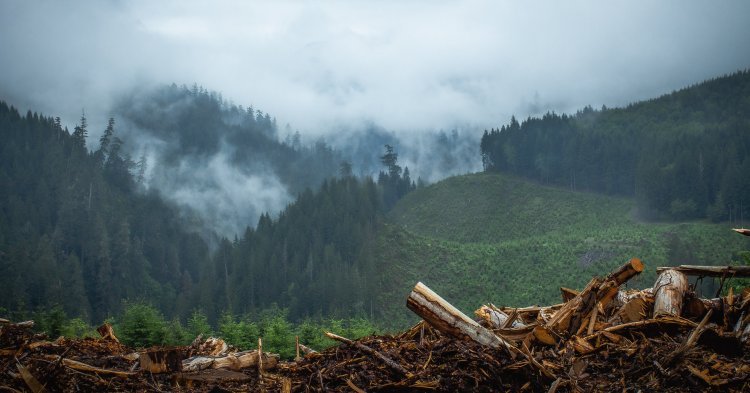He is the co-author, with Margherita Bianchi, of a report into envicrime sponsored by the AMBITUS project, led by the French Ministry of the Interior and funded by the EU Internal Security Fund, Titled ‘Fighting Environmental Crime in Europe’, it aims to be a “handbook” for those who want to combat this growing problem.
The New Federalist spoke to Colantoni about the dangers of envicrime, who it affects, and what actions the European community can take to stop it.
Personally, I’ve never seen any envicrime, but you say it is globally the fourth most lucrative illegal business?
I am quite sure you have – you probably just did not recognize it as an environmental crime.
Generally speaking, environmental crime has seen a spike in the involvement of organized crime groups because it is very lucrative, and punishments are clearly inadequate when compared to their impact on the environment and to the potential gain. Think of illegal fishing of tuna in the Mediterranean or the dumping of toxic wastes.
However, environmental crime is not only mafia-style operations, but also apparently perfectly legal activities, whose disregard for environmental protection laws cause great damage to ecosystems and to human health – chemical waste or air pollution are among these activities. We need to consider both the organized crime and the ‘white collar crime’ aspects of the issue. The latter variety is often committed by office workers or employees with low or often no knowledge at all of the illegality and the impact of their activities.
That sounds quite broad. So what is the definition of ‘environmental crime’?
The main issue with environmental crime is indeed the lack of a common and clear definition both at the EU and global levels. In our report we cited the European Commission’s perspective of considering environmental crime as any offence that brings ‘significant harm or risk to the environment and human health’, but this clearly falls short of being a proper definition.
There are individual definitions for single offences related, for instance, to waste or wildlife trafficking, but we are missing a comprehensive approach. This is likely the major drawback in action against environmental crime, at least for European countries.
I’ve read in your report that even within the EU the definitions of envicrime can vary quite a lot?
This is a major issue. Sometimes a member-state considers an offence as an environmental crime, while for another country it is just a non-specific offence. Sometimes the same offence faces criminal charges in one country, while in another, the offender is only liable to administrative fines. Considering the cross-border nature of most environmental crimes, this discrepancy among the member states greatly impacts the possibility of coordinated action against offences which hit multiple European countries, ranging from waste trafficking to illegal logging.
Is it true some EU member states don’t even have any official definition of envicrime?
Yes, and it is reflected in often uncoordinated actions on the topic by the different police forces of these countries. Yet some member-states have in the past few years advanced remarkably well towards combating envicrime, having set up dedicated units to tackle it and formulated a definition for it, getting significant results thanks to such structures. France is one of them.
Is envicrime much of a problem in the EU?
The EU is strongly and increasingly impacted by environmental crime and there is no member-state that is not hit by such offences. We have troubles all across Europe, from water theft in Spain to the contamination of huge areas by toxic waste in Italy.
There are even new kinds of crimes which we have not seen so far, such as emissions trade frauds. We are not only a victim of such offences, but also a receiver and/or a transit country for crimes committed elsewhere – I am thinking of illegally harvested timber from Africa and Asia, or wildlife trafficking.
So was the multi-billion-euro carbon tax ‘fraud of the century’, as we call it in France, an envicrime?
If you refer to the 1.6-billion-euro quota market scam, yes, it is clearly an environmental crime. This is a good example of how hard it sometimes is to define environmental crime, because it is a category which is evolving as we start to address new issues, such as climate change.
As far as I know, there is no research centre focusing exclusively on envicrime at the global nor at the European level.
This is because it would be hard to define what the activities for such a research centre would be. Fighting environmental crime requires a combination of policy, technology, law enforcement, scientific knowledge and skills. And this is why it is addressed by a combination of agencies at the national and European level, and analysed by different research centres, academics and NGOs. What we are missing is a central European coordination centre – a ‘control room’ for action against environmental crime in the EU.
Can new environmental regulations sometimes generate envicrime?
I would not say they could generate environmental crime. Sometimes, an excess of regulations can cause overlaps which, in turn, can create loopholes for environmental crimes to pass through unpunished. Generally speaking, we need to find a balance between addressing issues with dedicated laws and avoiding overregulation which could complicate the work of police forces, as they would need to possess incredibly vast knowledge which would need to be constantly upgraded.
Would you say envicrimes are victimless?
Absolutely not. The issue here is that environmental crimes appear victimless because their impact is often visible in the medium or even long term. Think of pollution from illegally disposed of waste or air or water pollution and their impact on the population living nearby. In Italy, but also across the EU, we have plenty of examples of a population which discovered that they were poisoned only decades after the illegal activities began. Even obvious crimes, such as oil spills, have long-lasting and diffused impacts we are often unable to fully estimate.
If I were a mafia kingpin, would you advise me to enter the envicrime business (financially speaking of course, not morally)?
Environmental crime is lucrative, and the associated risk is very low. That is why many organized crime groups are moving from other areas, such as drug or arms trafficking, to environmental crime. At the same time, this shows us a clear way to address the issue: we need to hit offenders where it hurts the most: their wallet. Sometimes hefty fines are the greatest deterrent because environmental crimes are first and foremost an economic crime.
Will the current economic crisis facilitate the work of organized criminal groups involved in envicrime?
Probably. Generally speaking, environmental crimes thrive in areas where there are fewer options for earning a living. They are often easy, low-risk and remunerative activities which, however, impact the potentials of areas to be productive in the medium and long term.
They are a bad investment, in this sense – but economic crises often make people turn to immediate solutions, and organized crime groups take advantage of that. It will be crucial for the recovery fund and for all the support measures taken against the COVID pandemic crises to address vulnerable areas, and to take into consideration the already evident rise in environmental crimes.
Lorenzo, to end our discussion on a positive note, what would you say?
While it is true that environmental crimes are on the rise, it is also true that we are living in a time where we have all the tools to fight them. It is not by chance the Ambitus project, under which this report has been written and published, has ‘Time has come to reverse the movement’ as its slogan.
From a policy perspective, the Green Deal has put the protection of biodiversity as one of its key objectives and it also expects a revision of the 2008 Environmental Crime Directive. The Council has listed the issue among its key priorities on several occasions, and so have several member-states.
From a technology perspective, the ease of adopting and sharing online databases, the use of GIS, drones and other forms of monitoring are making the gathering and exchange of information as accurate and simple as ever. A growing environmental awareness is also putting such issues at the top of political agendas. In other words: now is the time to act.


Follow the comments: |
|
